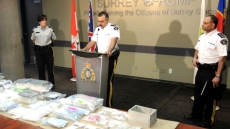VANCOUVER — When Rachael Lipetz started planning a budget wedding, the bride-to-be decided to cut costs in a non-traditional way — by focusing on something old.
The Vancouver bride's $5,000 budget didn't compare with the $30,717 that a 2015 Wedding Bells magazine survey found most brides expect to spend on their big day.
So Lipetz searched doggedly for second-hand wedding decor, a trend some industry professionals say has grown as wedding costs soar ever skyward.
She spent countless hours scouring Craigslist for deals, persistently emailing sellers with low-ball offers in hopes of finding cheap gems.
"I ended up becoming a total Craigslist troll," she says.
The signs, vintage napkins and cutlery at her lakeside celebration in September 2014 all came from a couple who had gotten married in a field months before. So did some of the pennant banners, but those, Lipetz says, had already been bought and sold twice previously.
"Basically, nothing at our wedding was new," she says.
Lipetz estimates that she saved about 50 per cent on decor by buying second-hand, and she and her husband liked the environmentally friendly aspect of using recycled goods.
"It was exactly what I wanted," she says. "I'm not a white wedding, magnolia type of person."
When the big day was over, Lipetz posted an ad of her own for the "ultimate rustic wedding package." She says about two-thirds of the items she had for sale were gone within two weeks.
High wedding costs have spurred couples not only to seek deals, but to resell whatever they can when their celebration is over, says Geneve McNally, founder of Bridal Swap, which she describes as a "fancy flea market" for weddings.
The annual event sees newlyweds set up booths to sell their wares and brides-to-be clamber for deals on everything from designer dresses to painted mason jars.

"Everyone loves the thrill of the hunt and finding some gem for cheaper," says McNally, a founding partner of Vancouver-based wedding planning company DreamGroup productions.
Bridal Swap has grown dramatically since the first event in 2011, she says, and this year's Vancouver market hosted more than 1,000 thrifty brides.
Lindsay Recknell says she's also seen "huge growth" in the three years since she created a website where brides sell their gently used wedding goods.
The Calgary-based entrepreneur says between 800 and 1,300 people visit Wedding Recycle every day from all over North America, buying and selling centrepieces, accessories and more.
Part of the site's popularity comes from brides posting pictures from their own weddings, Recknell says, because the photos give potential purchasers an idea of how their vision can come together.
Wedding Recycle also gives people a chance to connect with others who have experienced the ups and downs of wedding planning.
"There's something to be said about buying from someone who has gone through the same experience that you are," Recknell says. "You're buying from newlyweds who've just had their wedding, who've just felt the stress and the agony and the strain on their pocketbook."
Many second-hand wedding purveyors include a philanthropic element, too.
Bridal Swap gives women a chance to donate the proceeds from their dress to a charity of the purchaser's choice, and Wedding Recycle hosts the Can't Buy Me Love project, which connects newlyweds who want to donate decor and apparel with couples who can't afford luxurious weddings.
The project was inspired by a woman named Marisa Wiens, Recknell says, who started a Facebook group in 2013 encouraging brides to donate their gowns after a bridal store in New Westminster, B.C., burned down.

Through Recknell's website, Wiens connected with a woman in Calgary who didn't have the money to buy a brand-new gown.
Months later, Wiens says she received photos of the woman wearing her old dress on her wedding day.
"I thought it was pretty awesome," she says of the experience. "To me, that's what life's about — it's about giving."




